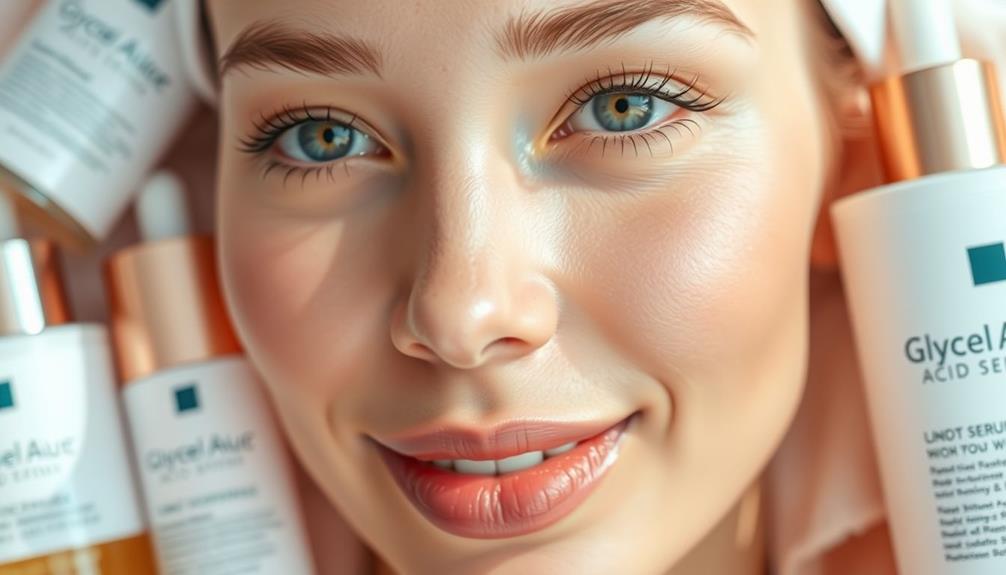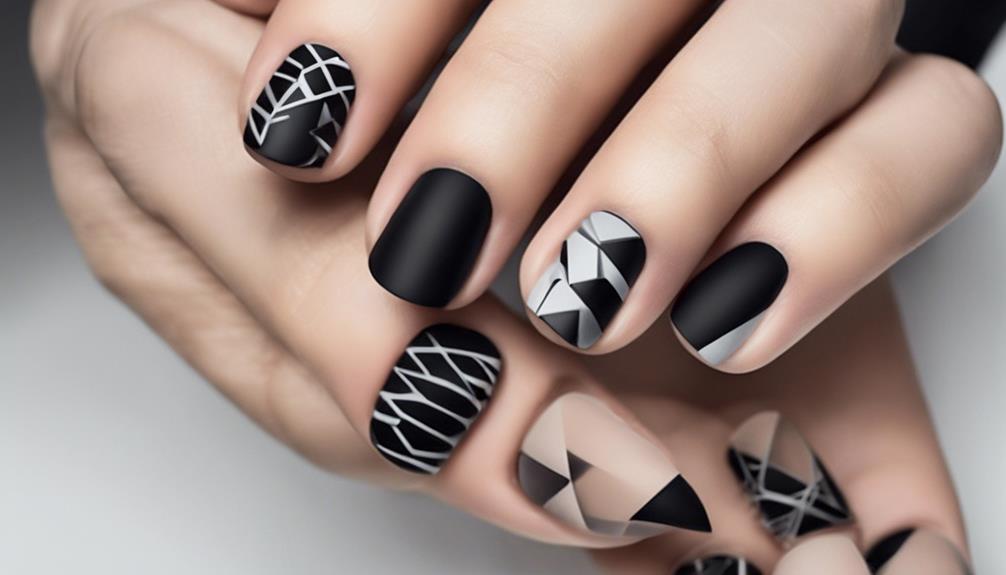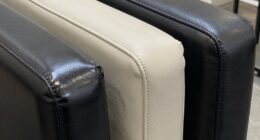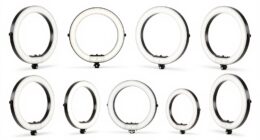Glycolic acid is a game changer for your hair. This alpha-hydroxy acid exfoliates your scalp, eliminating dead skin and product buildup. It promotes healthier hair growth by enhancing blood circulation and balancing your scalp's pH. Your locks will not only feel smoother and shinier, but you'll also notice improved texture and reduced breakage. With regular use, glycolic acid can help restore your hair's liveliness and thickness. Just be sure to apply it correctly and monitor for sensitivity. If you're curious about how to incorporate it into your routine, there's plenty more to discover!
Key Takeaways
- Glycolic acid exfoliates the scalp, removing dead skin cells and impurities, promoting a healthier environment for hair growth.
- Regular use enhances hair texture, making it smoother and shinier by increasing moisture retention and reducing breakage.
- It unclogs hair follicles, stimulating blood circulation and improving nutrient absorption for enhanced hair growth potential.
- Glycolic acid balances scalp pH, helping to prevent issues like dandruff and product buildup that can hinder hair health.
What Is Glycolic Acid?
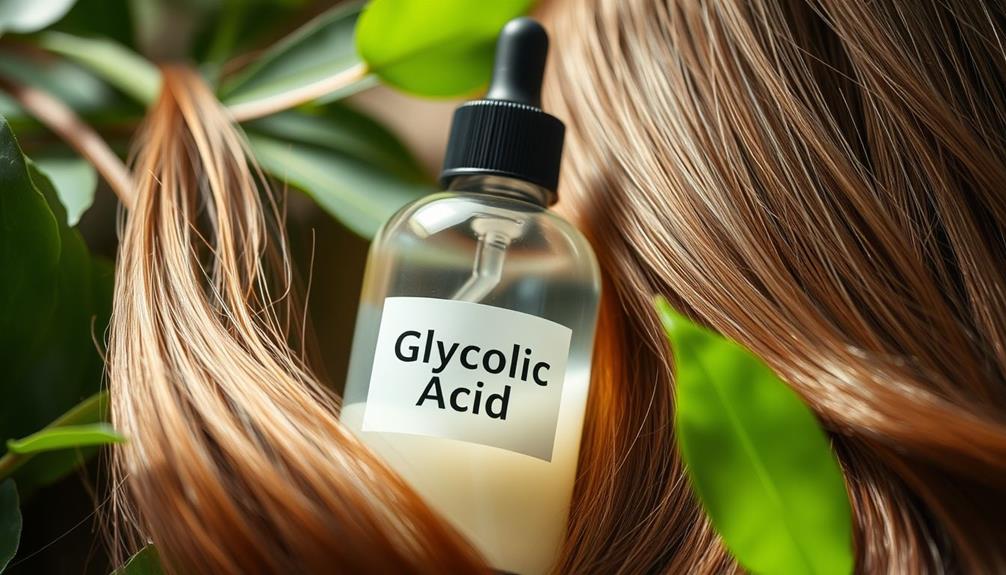
What's glycolic acid? It's an alpha-hydroxy acid derived from sugarcane, known for its powerful exfoliating properties. This small-molecule AHA penetrates deeply into both the skin and scalp, making it highly effective for promoting cell turnover and removing dead skin cells.
By exfoliating the scalp, glycolic acid helps eliminate product buildup and creates a healthier environment for hair growth. Regular use of treatments, such as hair treatments for damage, can further enhance the benefits of glycolic acid by restoring moisture and strength to your strands.
While most people associate glycolic acid with skincare, its benefits extend to hair care as well. When you incorporate glycolic acid into your hair routine, you might notice improved scalp health. A healthier scalp can lead to better circulation, which is essential for promoting hair growth.
Though research specifically focused on glycolic acid's effects on hair is limited, many experts believe that its exfoliating properties can enhance the absorption of hair growth ingredients, allowing them to work more effectively.
Benefits of Glycolic Acid
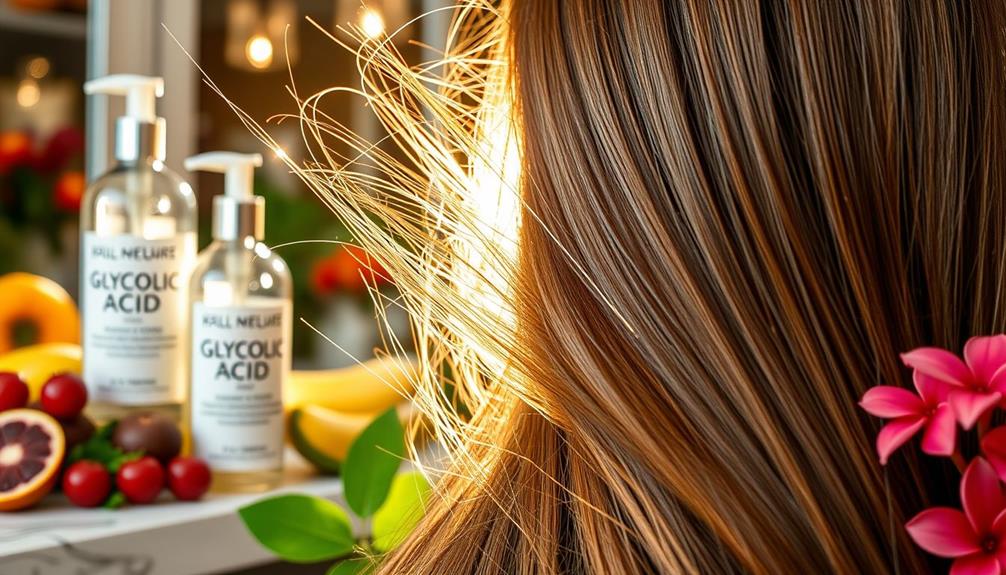
Glycolic acid offers significant benefits for your scalp and hair texture.
By exfoliating the scalp, it clears away dead skin and buildup, creating a healthier environment for hair growth.
Additionally, incorporating essential oils like lavender oil can further enhance hair growth and improve overall scalp health.
You'll also notice improved hair texture as it enhances moisture retention and reduces breakage, leaving your locks softer and more manageable.
Scalp Exfoliation Benefits
Exfoliating your scalp with Glycolic Acid effectively removes dead skin cells and impurities, promoting a healthier environment for hair growth. This powerful ingredient not only reduces dandruff but also addresses product buildup that can weigh your hair down.
Additionally, regular vet check-ups are essential for maintaining healthy hair and scalp conditions, similar to how they're fundamental for your cat's health. By incorporating Glycolic Acid into your hair care routine, you help clear away residue from styling products, leaving your scalp refreshed and revitalized.
One of the key benefits of this ingredient is its antibacterial properties, which can assist in treating scalp acne and improving overall scalp health. When your scalp is clean and free of impurities, it allows for better nutrient delivery to hair follicles, enhancing blood circulation and potentially stimulating hair growth.
Another advantage is Glycolic Acid's ability to balance your scalp's pH, preventing hair shaft swelling caused by alkaline shampoos. This balance supports ideal conditions for hair growth, ensuring your locks thrive.
Improved Hair Texture
When you incorporate glycolic acid into your hair care routine, you'll likely notice a significant improvement in your hair's texture, resulting in a smoother and shinier appearance. Glycolic acid works wonders by exfoliating your scalp, effectively removing product buildup and dead skin cells. This process not only enhances the overall health of your scalp but also prevents dullness and uneven texture.
With regular use, glycolic acid promotes cell turnover, which is vital for maintaining ideal scalp health. A balanced pH level is essential for healthy hair growth, and glycolic acid helps achieve that balance. As it increases moisture retention, you'll find your hair becoming softer, reducing breakage and enhancing its overall appearance.
Additionally, the exfoliating properties of glycolic acid boost blood circulation to your hair follicles, further improving hair texture and manageability over time.
How Glycolic Acid Works
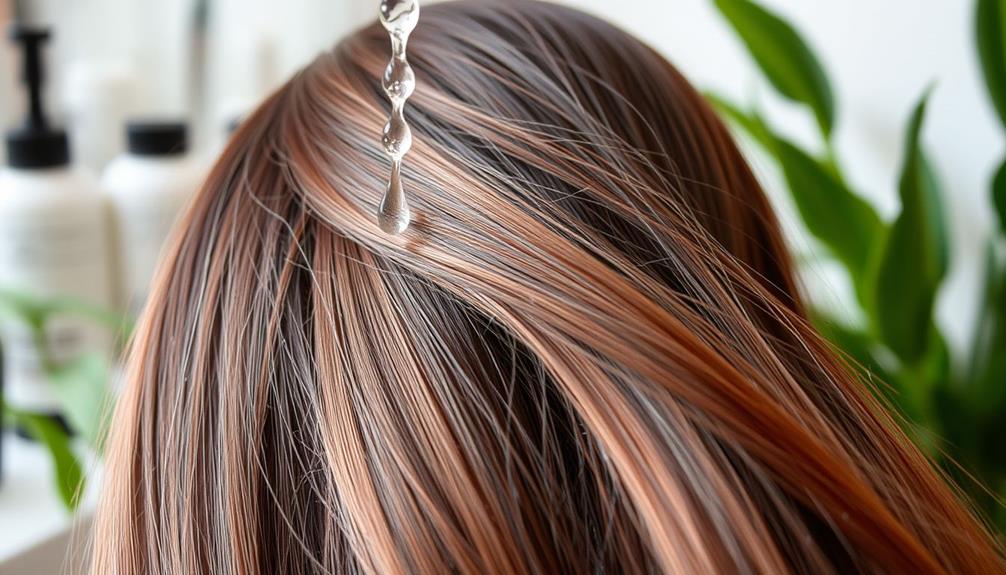
Glycolic acid works by exfoliating your scalp, removing dead skin cells and buildup that can hinder hair growth.
This process not only clears clogged follicles but also creates a healthier environment for your hair to thrive.
Additionally, it stimulates collagen production, strengthening your hair and reducing breakage.
Exfoliation and Scalp Health
The unique properties of glycolic acid allow it to effectively exfoliate the scalp, promoting a healthier environment for hair growth. By dissolving the bonds between dead skin cells, glycolic acid helps in exfoliating the scalp, which clears away product buildup and excess oil. This process not only reduces dandruff but also unclogs hair follicles, essential for maintaining ideal scalp health.
When you incorporate glycolic acid into your hair care routine, you're actively enhancing blood circulation to your scalp. This improved circulation boosts the delivery of nutrients and oxygen to hair follicles, creating favorable conditions for hair growth. Additionally, glycolic acid balances the scalp's pH, preventing issues often caused by harsh shampoos.
With regular use, you'll notice that your scalp feels cleaner and healthier, leading to smoother and shinier hair. Fundamentally, glycolic acid serves as a powerful ally in your quest for vibrant hair by focusing on scalp health first.
Enhanced Hair Growth Potential
Incorporating glycolic acid into your hair care routine not only promotes a healthier scalp but also enhances hair growth potential by removing impurities and stimulating blood circulation.
This powerful acid exfoliates the scalp, effectively clearing away dead skin cells that can clog hair follicles. When your hair follicles are unclogged, they're more capable of absorbing essential nutrients and oxygen, leading to stronger, healthier hair.
Glycolic acid also plays an important role in restoring your scalp's natural pH balance. Many harsh products disrupt this balance, which can hinder hair growth and overall scalp health. By using glycolic acid scalp treatments, you're actively working to prevent these issues.
Moreover, regular use of glycolic acid can improve your hair's texture and appearance. It reduces product buildup, resulting in smoother, shinier hair that feels revitalized.
While research on glycolic acid's direct impact on hair growth is still limited, anecdotal evidence suggests that incorporating it into your regimen may contribute to thicker, fuller hair over time.
Embrace glycolic acid for its potential to boost your hair health and achieve that enhanced hair growth potential you desire.
Application Techniques for Hair
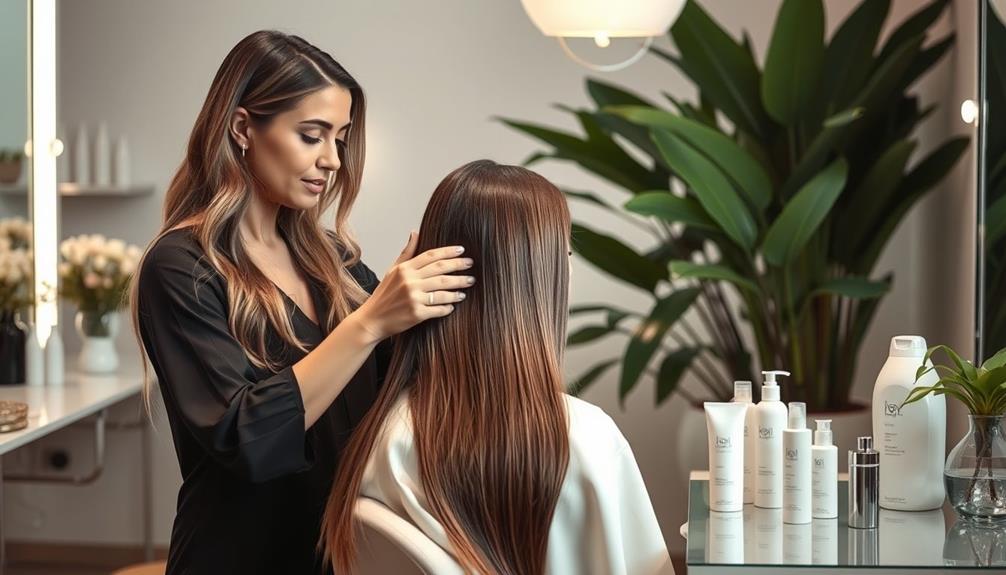
To maximize the benefits of glycolic acid for your hair, choose products with a concentration between 5-7% and apply them directly to your scalp and hair. This guarantees you create an ideal environment for absorption and effectiveness. Here are some application techniques to take into account:
| Step | Action | Tips |
|---|---|---|
| 1. Patch Test | Apply a small amount to a discreet area | Observe for 24 hours |
| 2. Direct Application | Massage into scalp and hair | Focus on roots and ends |
| 3. Rinse Thoroughly | Leave it for 20-30 minutes | Use lukewarm water |
Incorporate glycolic acid into your hair care routine once or twice a week, ideally in the evening. This timing helps to avoid sun sensitivity during the day. After application, follow up with a hydrating conditioner to restore moisture and prevent dryness, guaranteeing your scalp and hair remain healthy and vibrant. By using these application techniques, you'll enhance the overall health and appearance of your locks.
Frequency of Use
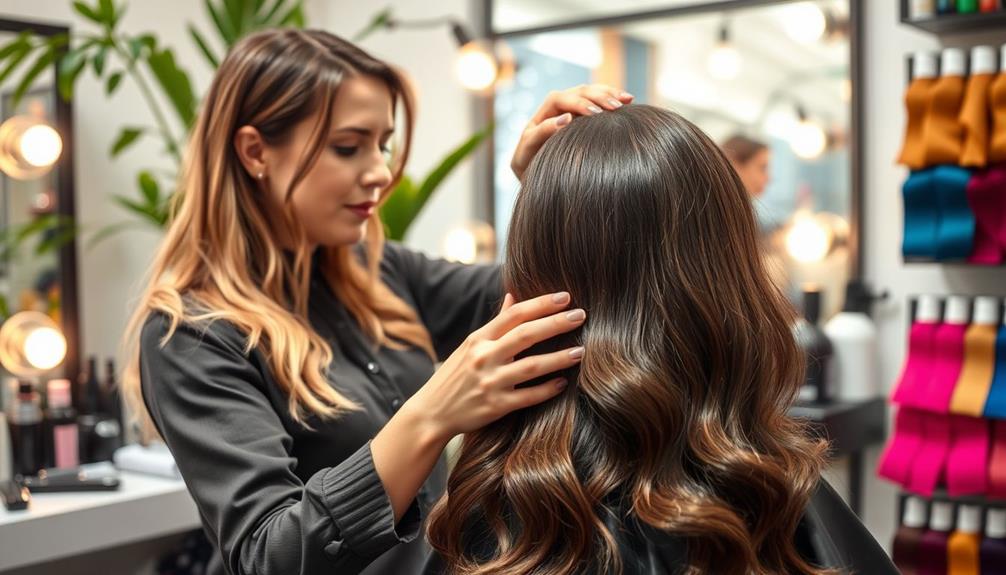
Using glycolic acid on your hair and scalp once or twice a week strikes the right balance between effectiveness and preventing irritation. This frequency of use allows you to reap the benefits without overdoing it.
Remember, the ideal concentrations of glycolic acid for scalp application are between 5-7%. This guarantees you get the best results while keeping your scalp healthy.
Here are some tips to make the most of your glycolic acid treatment:
- Evening Application: Apply glycolic acid in the evening to minimize sun sensitivity.
- Duration: Leave the product on for 20-30 minutes to maximize its benefits.
- Consistency is Key: Regular use over time is essential for healthier hair and improved scalp health.
Risks and Precautions

While glycolic acid can offer significant benefits for your hair, it's essential to be aware of the potential risks and precautions associated with its use. Some people may experience irritation or dryness when using glycolic acid on their hair, especially if they have sensitive skin or scalp conditions. It’s important to always perform a patch test before using glycolic acid for hair health, and to follow the instructions carefully to minimize any potential negative effects. Additionally, it’s a good idea to consult with a dermatologist or trichologist before incorporating glycolic acid into your hair care routine, especially if you have any underlying scalp or hair issues.
First, make sure that you use glycolic acid in concentrations below 10% and with a pH of 3.5 or higher to minimize irritation. Be cautious of side effects such as scalp irritation, redness, itchiness, and overdrying, which can negatively impact hair health if not managed properly.
If you have existing scalp conditions like sores or dermatitis, avoid using glycolic acid, as it can worsen these issues. Additionally, if you have a very dry scalp or have recently undergone chemical treatments, it's best to steer clear of glycolic acid, as it may lead to further complications.
You should also be mindful of increased sensitivity to UV radiation when using glycolic acid, which heightens your risk of sunburn. Always apply sunscreen if you plan to be outdoors after treatment.
Alternatives to Glycolic Acid

When seeking alternatives to glycolic acid for hair care, consider effective options like minoxidil, which stimulates hair regrowth and is particularly beneficial for those facing androgenetic alopecia.
Beyond glycolic acid, several other hair care products can help address hair loss and improve scalp health.
Here are some alternatives to explore:
- Finasteride: An oral medication that effectively treats male pattern baldness but isn't recommended for women, especially premenopausal females.
- Steroid creams: These can reduce inflammation and encourage hair growth for specific types of hair loss like alopecia areata.
- Anti-fungal shampoos: Shampoos with ketoconazole and zinc pyrithione combat dandruff and scalp conditions that may contribute to hair loss.
Causes of Hair Loss

When it comes to hair loss, understanding the causes is vital.
Genetic factors play a major role, as conditions like androgenetic alopecia can affect you as you age.
Additionally, environmental stressors can disrupt hair growth, making it important to recognize how your surroundings impact your locks.
Genetic Factors Impacting Hair
Genetic factors play an essential role in hair loss, with conditions like androgenetic alopecia affecting about 50% of people by age 50. This hereditary condition is tied to sensitivity to dihydrotestosterone (DHT), which can lead to hair thinning by shrinking hair follicles. If you have a family history of hair loss, you might be at a higher risk.
To help manage genetic hair loss, consider these important points:
- Family History: Your risk increases if your parents or grandparents had hair loss.
- Pattern Recognition: Male-pattern and female-pattern baldness are common manifestations.
- Early Diagnosis: Understanding your genetic predisposition is crucial for effective treatment.
The relationship between glycolic acid and scalp health can help enhance the effectiveness of hair products, potentially delaying the effects of hair loss. By focusing on these genetic factors, you can take proactive steps in your hair care routine and seek treatments tailored to your needs.
Environmental Stressors Affecting Growth
Environmental stressors like pollution and UV radiation can greatly hinder hair growth and lead to increased hair loss. These factors create oxidative stress that damages your hair follicles, making it essential to adopt protective measures. Glycolic Acid can help combat these issues by exfoliating your scalp, promoting healthier hair growth while preventing breakage.
| Environmental Stressor | Effect on Hair | Glycolic Acid Benefit |
|---|---|---|
| Pollution | Damages follicles | Exfoliates scalp to remove buildup |
| UV Radiation | Weakens hair structure | Boosts hydration and shine |
| Chlorinated Water | Causes brittleness | Strengthens hair strands |
| Chemical Treatments | Irritates scalp | Calms inflammation, promoting growth |
Using products enriched with Glycolic Acid can help you fend off the adverse effects of these environmental stressors. By incorporating it into your hair care routine, you can enhance your scalp health, reduce breakage, and ultimately support hair growth. Remember, taking care of your hair means considering the surrounding environment and how it impacts your locks.
Importance of Professional Consultation

Consulting a hair care professional is essential for getting personalized advice tailored to your specific scalp and hair needs. By seeking a professional consultation, you can guarantee that your hair care routine is effective and safe, especially when incorporating glycolic acid products. Here's why it's important:
- Individual Assessment: Professionals assess your scalp conditions and hair type to recommend appropriate glycolic acid concentrations.
- Early Diagnosis: They can identify hair-related issues early, providing tailored treatment plans that address specific concerns.
- Comprehensive Approach: Experts help uncover underlying causes of hair loss, like hormonal imbalances or nutritional deficiencies.
Summary of Key Points

Understanding the benefits of glycolic acid for hair reveals its powerful role in promoting scalp health and stimulating hair growth. This water-soluble alpha hydroxy acid (AHA) works wonders through effective exfoliation, helping to clear dead skin cells and buildup on the scalp. By doing so, it reduces dandruff and unclogs hair follicles, creating a healthier environment for hair growth.
When you incorporate glycolic acid into your hair care routine, you can enhance blood circulation to the hair follicles. This increased blood flow delivers essential nutrients and oxygen, which are vital for stimulating hair growth and improving overall hair texture. Additionally, regular use of glycolic acid can help balance excess oil production on the scalp, which contributes to a fresher feeling for longer.
To enjoy these benefits, it's recommended to use glycolic acid in low concentrations of 5-7% and apply it once or twice a week to minimize potential scalp irritation and dryness. By following these guidelines, you can effectively harness the power of glycolic acid for healthier, more vibrant hair.
Frequently Asked Questions
What Are the Benefits of Using Glycolic Acid in Your Hair?
Using glycolic acid in your hair routine helps exfoliate the scalp, promoting healthier growth and reducing dandruff. It balances pH, enhances circulation, and clears buildup, resulting in smoother, shinier hair that's easier to manage.
How Often Should You Use Glycolic Acid on Your Hair?
You should use glycolic acid on your hair once or twice a week. This frequency helps with effective exfoliation without causing irritation. Always follow up with a hydrating conditioner to maintain moisture and scalp health.
Can You Leave Glycolic Acid on Your Scalp Overnight?
While it might seem tempting, you shouldn't leave glycolic acid on your scalp overnight. It can irritate your skin, so stick to 20-30 minutes instead, then wash it off to keep your scalp happy.
What Are the Side Effects of Glycolic Acid on Hair?
Glycolic acid can cause scalp irritation, redness, and dryness. If you overuse it, your hair might become brittle or break. Always test on a small area first to avoid adverse reactions, especially if you have sensitive skin.
Conclusion
Incorporating glycolic acid into your hair care routine can be like adding a burst of sunshine to a cloudy day.
It revitalizes your locks, peeling away the weight of dullness and revealing vibrant, healthy hair beneath.
Just remember, like a gardener tending to delicate flowers, consult a professional to guarantee you're nurturing your hair in the best way.
With the right approach, you'll watch your hair bloom into a luscious mane that turns heads and radiates confidence.

